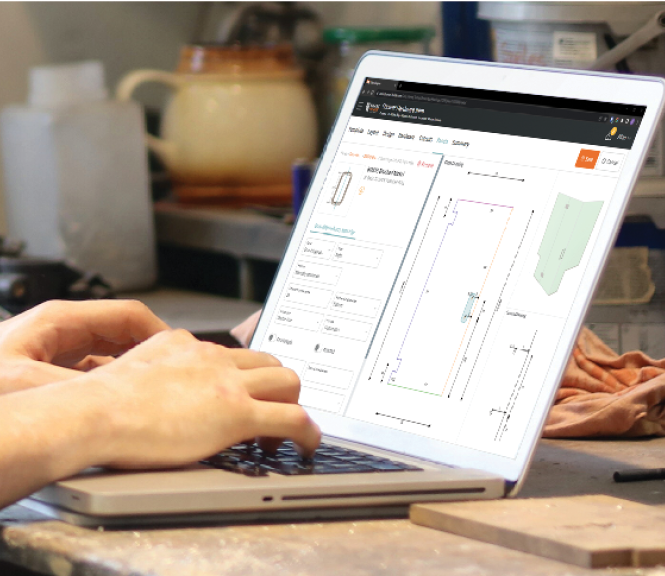Bridging the Labor Gap
Can software revolutionize operations and help bridge the workforce gap in an industry shortage?
The Bottom Line: Industry-specific software can help glass businesses overcome skilled labor shortages by streamlining workflows, improving productivity and enhancing operational efficiency. However, there is often resistance to adopting digital solutions.
 The skilled labor shortage in the glass industry is a pressing concern. Across the board, glass businesses are struggling to recruit qualified workers. This lack of manpower impacts day-to-day operations and hinders glass businesses’ ability to meet high customer demand.
The skilled labor shortage in the glass industry is a pressing concern. Across the board, glass businesses are struggling to recruit qualified workers. This lack of manpower impacts day-to-day operations and hinders glass businesses’ ability to meet high customer demand.
Fortunately, innovative solutions exist to address this challenge.
Industry-specific software offers a unique opportunity to streamline workflows and free up time for installers and office staff.
Resistance to digital solutions
A divide exists between traditional glass shops and the digital revolution sweeping through many modern businesses. Resistance to software is common, often due to entrenched tradition or simply a preference for familiarity.
The unforgiving and complex nature of glass also poses a challenge for software developers. Glass projects need meticulous design considerations, accurate cost estimation, and precise order fulfillment.
Generic software may not take this into account. Even glass-specific options may fall short as they are often built by modifying existing job-management software. As a result, many businesses stick to outdated systems like pen and paper or Excel.
How can software help?
With nearly two centuries of history, the glass industry has understandably relied on traditional methods like pen and paper for data capture. Although these methods may have served well in the past, they bring significant challenges. Records can easily be misplaced, leading to mistakes, missed opportunities and delays in project management. The manual nature of these systems makes them vulnerable to errors and misinterpretation. Glass software can solve these issues in several ways:
- Efficient design. Software built specifically for glaziers can dramatically improve speed and efficiency. Auto-calculation features streamline cost estimation and pricing and give busy glaziers instant insights into profitability. Cloud-based software also gives glaziers the ability to work remotely or onsite.
- Streamlined operations. Glass software can include features to enhance efficiency, including quote generation, facilitating online payments and task automation, freeing up time so glaziers can focus on higher-priority tasks. Scheduling tools can enable glaziers to optimize routes and reduce travel time.
- Increased productivity. The most significant advantage to adopting software is the dramatic increase in productivity. Eliminate manual tasks like data entry, paperwork and scheduling hassles. This significantly reduces mistakes and reworks, freeing up valuable time for your team. Consequently, operational costs are reduced, and team morale improves.
- Improved cash flow. Effective software plays a crucial role in cash flow management for glass businesses. By automating the invoicing and accounting processes, software minimizes debtor days and improves liquidity.
- Enhanced field communication. Good software empowers installers to work on projects from the field, reducing their reliance on office-based communication. Features such as photo uploads, note-taking capabilities and real-time updates enable installers to promptly address issues, reducing delays and errors in each project.
Finding the right software
Before purchasing software, it’s important to ensure you choose the right option for your business. Consider if the tool is right for you:
- Can the software calculate pricing for your various glazing projects?
- Can the software produce shop or fabrication drawings for the ordering process?
- Can the software track the status of your projects?
- Will the software make it easy for anyone in your team to see what is happening with a job?
- Does the software work both in the field and the office?
- Is the software backed by a team that understands the glass industry?
This last point is important: Industry-specific support goes beyond basic troubleshooting. When a question arises about an IGU or a shower hinge, having knowledgeable support can quickly solve problems and prevent costly delays.
It can also help to have a list of features categorized into “need to have,” “nice to have” and those you don’t care about. This helps you to rule out feature-heavy options that don’t necessarily have what you need to run your company.
In conclusion, although the labor shortage does present a challenge, software can bridge this gap by streamlining operations and unlocking new possibilities for growth. By investing in the right software, glass businesses can not only weather the current storm but emerge stronger and more efficient. A collective shift toward technology and innovation has the potential to revitalize the industry and ensure its continued success for generations to come.


